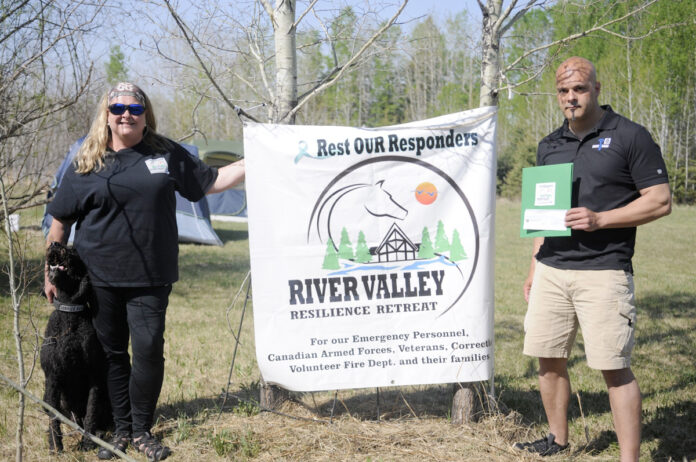
The first time John Lambiris walked down the forest path at the future home of the River Valley Resilience Retreat (RVRR), he was taken aback by the calmness of the bush.
“It’s very peaceful and relaxing,” he said as he reached a small clearing on the dirt path that leads from a pasture to the banks of the North Saskatchewan River.
“There’s a calmness here that just allows you to be in the moment.”
Lambiris is a correctional officer and the vicre president of the local chapter of the Union of Canadian Correctional Officers (UCCO). He knows first-hand how important accessible services are for first-responders, including corrections officers, who witness or experience trauma at work.
He said the site, located about 20 minutes west of Prince Albert in the RM of Duck Lake, “would help (people) with being present in the moment, and being able to get away from everyday life and chaos and being able to focus on yourself and this serenity.
The ten-acre parcel of land along the south shore of the North Saskatchewan River in the Lily Plain area was donated to the RVRR group.
“Lots of people, unless they’re forced to, live in their everyday routines and chaos. Being out here forces you to look around and look at the trees and the river, and see how calm it is.”
RVRR would provide responders with a secluded and safe respite to relax, recover and learn resilience skills to support them in their personal and professional lives.
The vision is to also provide peer supports and other aids before the effects of post-traumatic stress or trauma begin to further compound.
The full effect of workplace trauma is only just starting to be understood. Studies have shown that as many as one-third of serving correctional officers battle Post-Traumatic Stress Disorder, or PTSD.
PTSD is just one example of an Operational Stress Injury or OSI, defined as any persistent psychological difficulty resulting from operational duties. It can include anxiety disorders, depression, PTSD and other conditions that interfere with daily functioning.
A 2016 study estimated that 70,000 non-federal firefighters, police and paramedics have suffered from PTSD. A 2017 study found that 44.5 per cent of the 5,813 public safety personnel participants screened positive for one or more symptoms consistent with mental disorders.
The Government of Canada has estimated that as many as 36 per cent of male correctional officers have been diagnosed with post-traumatic stress disorder (PTSD). Studies have pegged the percentage of correctional officers battling mental health concerns linked to workplace trauma at as high as 57 per cent.
The RVRR’s project got a boost from UCCO last Tuesday, as Lambiris presented them with a donation on behalf of their local union members.
“W’ve had many of our members locally go through some trauma at work, and officers realize that there is a lack of services in Prince Albert for post-traumatic stress and coccupational stress injury,” he said.
“This resilience retreat is huge for Prince Albert and the community.”
RVRR co-founder Michelle McKeaveney said UCCO’s involvement is “near and dear” to her personally. She was a correctional officer, as was her husband, who was a UCCO member for 26 years until he retired.
“It’s critical that corrections be included in a first responder demographic, and it’s critical that correctional officers and their families are welcomed here,” she said.
She, and others, say their site could be life-saving.
According to McKeaveney, a week or two ago, a veteran in crisis reached out. He was brought to the land site.
“He drove p the hill with a different person. That was just a peer perspective. We already know the land works and the peer support works. We’ve got a win-win already.”
While the RVRR works on a business plan, the site is being used in the daytime for peer support, including the What’s Important Now (WIN) Peer Support group for first responders suffering from operational-stress injuries such as PTSD.
The RVRR has been looking for a home for well over a year. They have since settled on the site west of town, on property owned by Roger and Darlene Cote. Right now, it’s being used for day use and peer support, “just to bring a sense of calmness,” McKeaveney said.
“We’re going to do what we need to do here and give (responders) good tools onsite while linking them up with outside resources in the future.”
The site RVRR aims to keep using was once used for a forestry operation. Since then, it’s been used for the Cotes to enjoy peace and quiet, and connect with nature.
Darlene said she heard Michelle was looking for a spot.
“I knew a spot,” she said.
We love living out here. Step out of yourself and your problems and enjoy your time. You can sit down there and enjoy the water or sit here and enjoy the leaves in the trees,” she said.
Darlene knows firsthand what first responders battle. She was a nurse, and her husband worked in search and rescue.
“As a nurse, you tried to park it (at work) and leave it there.”
She mostly worked in the surgery unit, but did, at times, lose patients.
“You take it home, because it’s hard not to when they don’t do well.”
Her land, and the first responder peer support that takes place there, could make a world of difference.
“It is a retreat,” Darlene said. “it is a refuge, secure, quiet – what a retreat should be. It’s helping people.”

